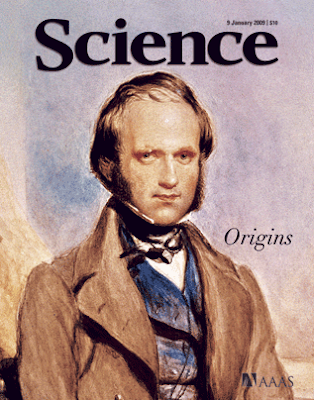
La prestigiosa revista científica Science ha editado este enero de 2009 un especial enteramente dedicado a uno de los grandes naturalistas de la historia. Este no podría ser otro que el señor Carlos Darwin. Diferentes autores hacen un repaso a las aportaciones de la teoría de la evaluación y a la situación en la que se encuentra tras los últimos descubrimientos científicos. La propia introducción de la revista explica con claridad los contenidos de este número dedicado a Darwin:
Happy Birthday, Mr. Darwin
Andrew Sugden, Caroline Ash, Brooks Hanson, Laura Zahn
The diversification and speciation of living organisms are the broad theme for this special section, continuing our celebration of Charles Darwin's 200th birthday. The five Reviews in this section present multiple views on research on diversification at scales ranging from the macroevolutionary to the molecular. Benton (p. 728) examines the extents to which biotic and abiotic factors have shaped species diversity in the fossil record. Gavrilets and Losos (p. 732) use theoretical predictions and empirical data to identify general patterns in the temporal, spatial, and genetic/morphological properties of adaptive radiation. Schluter (p. 737) reviews how research on ecological speciation has shifted in focus from morphological evolution to reproductive isolation, tracing the links between Darwin's ideas and current thinking. Fraser et al. (p. 741) discuss the contentious area of microbial species formation. Finally, using examples from studies of genes and mutations involved in evolutionary change, Stern and Orgogozo (p. 746) illustrate how developmental biology and evolutionary theory might combine to reveal new predictive principles of genetic evolution.
The special section is accompanied by evolutionary coverage in all other sections of the magazine. The News section features the second in our series of monthly "origins" essays, on the origins of art and symbolic behavior. The Commentary section includes reviews of new evolutionary books. Science Careers carries a feature on researchers in the museum world, who play a vital role in evolutionary research. In Reports, Krug et al. (p. 767) reveal the legacy of the end-Cretaceous mass extinction for the subsequent diversification of bivalves [see the accompanying Perspective by Crame (p. 720)]. With a focus on conservation, Carnaval et al. (p. 785) model spatially explicit evolutionary processes in endemic tree-frog species in the Brazilian Atlantic Forest (the biodiversity hotspot that inspired Darwin during his South American landfall). Forbes et al. (p. 776) reveal how a recent host shift of the fly Rhagoletis pomonella, a model for sympatric speciation, has led to incipient speciation in a parasitoid wasp that attacks the fly. Rowland and Emlen (p. 773) show facultative male trimorphism in dung beetles, a hitherto unsuspected level of intraspecific variation. Tang and Presgraves (p. 779) report a cellular and molecular mechanism of hybrid sterility, which has a key role in speciation in Drosophila. And in Science Express, there is an echo of another of Darwin's central interests: Anderson et al. show that a melanism mutation has been selected for in gray wolves, most likely after a hybridization event with domestic dogs.
This is a sample, not a survey. Research on speciation and diversification is itself expanding and diversifying. Evolutionary topics have been covered more frequently in Science in the first decade of the 21st century than in any previous one (and an order of magnitude more than in the years of the Modern Synthesis in the mid-20th century). This reflects not only the continuing efforts to understand and document the selective forces leading to speciation, but also how genetic research is homing in on the molecular and cellular mechanisms that enable diversification to occur. Darwin, we hope, would be thrilled.
- The Year of Darwin. Science 6. Vol 323. 2009
eseweyque
ResponderEliminar